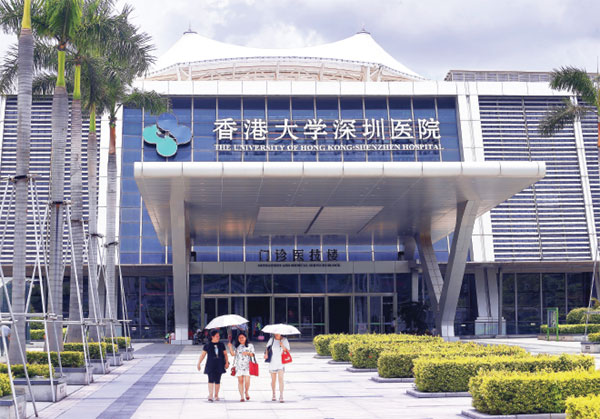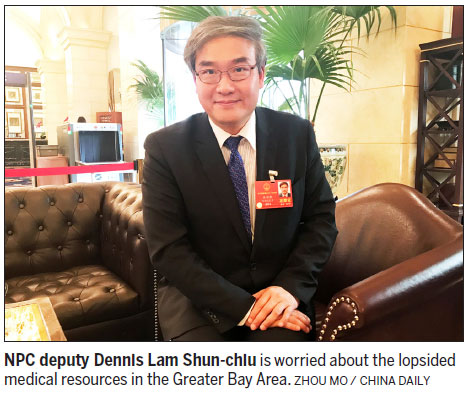Global talents 'key to medical uplift' in GBA

HK deputy urges easier entry for professionals to upgrade services
International medical service talents are crucial for the Guangdong-Hong Kong-Macao Greater Bay Area in building a pleasant place to live in, and more favorable conditions should be created to facilitate their work there, said a Hong Kong deputy to the National People's Congress, the country's top legislative body.

The University of Hong Kong-Shenzhen Hospital, which opened in 2012 in Shenzhen's Futian district, is said to be the first "Hong Kong-style" public hospital in the city. The 600-bed facility was built and funded by the Shenzhen municipal government. Roy Liu / China Daily
Medical resources in the Greater Bay Area are currently unbalanced, with Hong Kong having a large pool of outstanding doctors, and some underdeveloped cities struggling with a shortage of medical personnel and quality medical services, said Dennis Lam Shun-chiu, who is also director of C-Mer Eye Care.
As integration between Hong Kong and the mainland deepens, with the Guangzhou-Shenzhen-Hong Kong Express Rail Link and the Hong Kong-Zhuhai-Macao Bridge due to come into operation later this year, more people from Hong Kong are expected to work and live in the bay area, and the flow of people between mainland cities in the region is also expected to increase.
That would require more international medical service talents to work on the mainland to enhance the quality of medical services in the Greater Bay Area, Lam said.
"However, the current system for the mainland to introduce international talents in the medical field is complicated," he told China Daily in an interview on the sidelines of the annual two sessions in Beijing.
"At present, international talents need to submit dozens of documents to various government departments to get approval to work on the mainland for a period of time. The procedure would normally take about three months, and they have to go through the process of qualification examination once a year," he said.
Such a system, he said, is not conducive to attracting those talents. Moreover, there's still a wide gap in wages between doctors working on the mainland and those in Hong Kong.
"Hong Kong doctors are normally paid 50 percent higher for conducting a surgery compared with their mainland counterparts. Wages for doctors on the mainland are lower and the costs of medical consumables are higher."
Lam called for measures to simplify the procedure for introducing international medical service talents, such as changing the frequency of qualification examinations from once annually to once every three years.
"As for the difference in wages, mainland authorities in the Greater Bay Area could offer subsidies to international talents who work in the city cluster. This would lure more outstanding talents to the region, and the bay area would become a more pleasant place for people to live in."
Lam also said the bay area would be a priority place for C-Mer's future development.
As the first Hong Kong-funded ophthalmic hospital on the mainland, C-Mer began operations in Shenzhen in 2013, and opened another branch in Beijing this year. "We'll look for suitable cities in the bay area to expand our services, taking into consideration their transportation network, local demand, as well as government support," he said.








